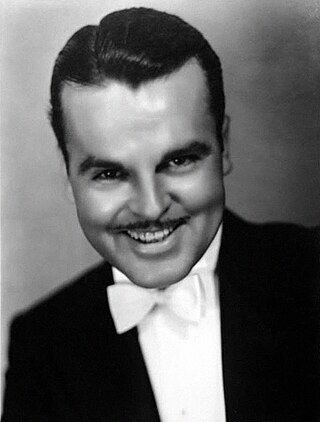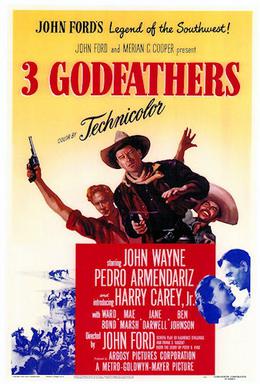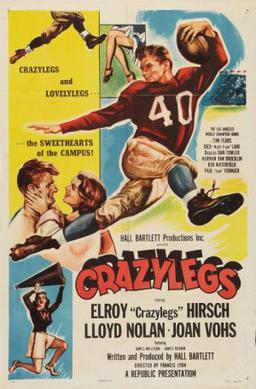Plot
Coach Dudley is a hard-driving college football coach, who strives to shape the character of his players, transforming them into real men. Unfortunately, the Coach's son, Bob, who plays for him, hates sports and participates only because he is forced to do so. Bob lets his team down through cowardice and laziness and as a result is rejected by his father, his college sweetheart Dorothy, and his school. Bob joins a rival college team with the plan to defeat his father's team. In the end, Bob pulls himself together to win the Big Game, proving himself worthy of his father's name.

Wardell Edwin Bond was an American film character actor who appeared in more than 200 films and starred in the NBC television series Wagon Train from 1957 to 1960. Among his best-remembered roles are Bert the cop in Frank Capra's It's a Wonderful Life (1946) and Captain Clayton in John Ford's The Searchers (1956). As a character actor, Bond frequently played cowboys, cops and soldiers.
John Sutton, 3rd Baron Dudley, commonly known as Lord Quondam, was an English nobleman.

Charles John Holt, Jr. was an American motion picture actor who was prominent in both silent and sound movies, particularly Westerns.

John Brown was an American college football player and film actor billed as John Mack Brown at the height of his screen career. He acted and starred mainly in Western films.

James Neil Hamilton was an American stage, film and television actor, best remembered for his role as Commissioner Gordon on the Batman TV series of the 1960s, having first played a character by that name in 1928's Three Week-Ends. During his motion picture career, which spanned more than a half century, Hamilton performed in over 260 productions in the silent and sound eras.

John Elmer Carson, known as Jack Carson, was a Canadian-born American film actor. Carson often played the role of comedic friend in films of the 1940s and 1950s, including The Strawberry Blonde (1941) with James Cagney and Arsenic and Old Lace (1944) with Cary Grant. He appeared in such dramas as Mildred Pierce (1945), A Star is Born (1954), and Cat on a Hot Tin Roof (1958). He worked for RKO and MGM, but most of his notable work was for Warner Bros.

3 Godfathers is a 1948 American Western film in Technicolor directed by John Ford and starring John Wayne, Pedro Armendáriz and Harry Carey Jr.. The screenplay was written by Frank S. Nugent and Laurence Stallings based on the 1913 novelette The Three Godfathers by Peter B. Kyne. The story is a loose retelling of the biblical Three Wise Men in an American Western context.

The United States competed at the 1952 Summer Olympics in Helsinki, Finland. 286 competitors – 245 men and 41 women – took part in 133 events in 18 sports. They won 76 medals, including 6 podium sweeps; the highest number of medal sweeps in a single Olympiad by one country since World War II and still a record.

Joan Marsh was an American child actress in silent films between 1915 and 1921. Later, during the sound era, she resumed her acting career and performed in a variety of films during the 1930s and 1940s.

Edward Sedgwick was an American film director, writer, actor and producer.

Spring Fever is a 1927 American silent comedy film starring William Haines, Joan Crawford, and George K. Arthur, and directed by Edward Sedgwick. Based on the 1925 play of the same name by Vincent Lawrence, this was the second film starring Haines and Crawford, and their first onscreen romantic teaming.

West Point is a 1927 American silent romantic drama film starring William Haines and Joan Crawford in a story about an arrogant cadet who finds love right before the all-important Army–Navy Game.

Brown of Harvard is a 1926 American silent drama film directed by Jack Conway, and starring William Haines, Jack Pickford and Mary Brian. Released by Metro-Goldwyn-Mayer, the film is based on the successful 1906 Broadway play Brown of Harvard by Rida Johnson Young, who also co-wrote the popular music for the play along with Melvin Ellis. The film is best known of the three Brown of Harvard films. It was John Wayne's film debut. Uncredited, Wayne played a Yale football player. Grady Sutton and Robert Livingston, both of whom went on to long and successful careers, also appear uncredited. The 1918 film included future Boston Redskins coach William "Lone Star" Dietz and the only Washington State University football team to win a Rose Bowl.

That's My Boy is a 1932 American pre-Code drama film directed by Roy William Neill and starring Richard Cromwell and Dorothy Jordan. John Wayne had a very small uncredited role in the film.

Girls in Prison is a 1956 American sexploitation women in prison drama film about a young woman who is convicted of being an accomplice to a bank robbery and is sent to an all-female prison. The film was directed by Edward L. Cahn, and stars Richard Denning, Joan Taylor, and Mae Marsh. American International Pictures released the film as a double feature with Hot Rod Girl.

Crazylegs is a 1953 film about Elroy Hirsch's football career. In college his unconventional dynamic running style allowed him to change directions in a multitude of ways. The media dubbed him "Crazylegs". The name stuck all through his professional career and life. The bulk of this film is centered on his college days. Crazylegs later became part of the foundation of the "Three End" with the LA Rams. This film captures the genuine quality of Hirsch's personality, with Hirsch playing himself in the part.

Wayne Richard Moore was an American competition swimmer, Olympic champion, and former world record-holder.

The Cheat is a 1923 American silent drama film produced by Famous Players–Lasky and distributed by Paramount Pictures, and is a remake of Cecil B. DeMille's 1915 film of the same name using the same script by Hector Turnbull and Jeanie MacPherson. This version stars Pola Negri and was directed by George Fitzmaurice.

Triple Threat is a 1948 American drama sport film directed by Jean Yarbrough, produced by Sam Katzman, and starring Gloria Henry.
Events from the year 1931 in Michigan.


















